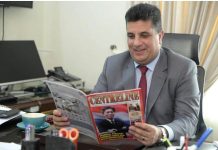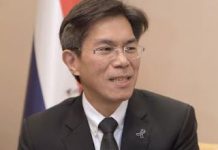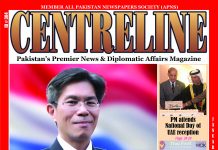Dr. Ahmed Benflis:
51st Anniversary of Restoration, National sovereignty, and Independence of Algeria, (1962 to 2013)
Algeria is celebrating 51st Anniversary of Restoration, national sovereignty and independence. Ambassador of Algeria to Islamic Republic of Pakistan Dr. Ahmed Benflis issued a special message on this special occasion. The full text of the message of the ambassador is given below for readers interest. For the 5th consecutive time, from the land of the brotherly Pakistan, I have the opportunity to write few words on the glorious and great occasion that signifies the greatness of the Algerian people. It is the 51st anniversary of the restoration of Algerian sovereignty and dignity on its sacred land after long years of struggle against the French colonists.
The Algerian people celebrate every year the 5th July day. Justice, freedom and peace- loving people throughout the world share this celebration with the Algerian people. The 5th of July 1962 registers one of the best pages of the Algerian struggle to achieve liberation, independence, and to restore the national sovereignty which was usurped for 132 years of wanton occupation and exploitation of natural and human resources by the French colonists. It is an occasion of reflection and recognition of those who sacrificed themselves and shed their precious blood for the sake of the motherland. It is very dear and valuable anniversary to the Algerian people to take lessons in sacrifice that remind us the heroics of the fathers and grandfathers and their immense sacrifices throughout our long history of struggle against the occupation.
While the 5th of July 1962 signifies an end of dark and cruel era of colonialism in Algeria, it reminds us of the miserable day of 5th July 1830 whereby the French colonists implemented its expansionist intention by occupying Algeria and ignoring all international laws and covenants.
Therefore this 5th July day is a symbol that we celebrate to revive the anniversary of our freedom and independence. This achievement has come after bitter suffering on the hand of the French imperialists and their allies of mercenaries, agents and troops of Atlantic Alliance. But the will of the Algerian people which is derived from the will of God, was more powerful than the might of the colonists. The 8th May 1945 processions were the decisive turning point that contributed to the outburst of the Algerian revolution on 1st November 1954. On that date, the Algerians took to the streets demanding freedom and independence. But the French colonists used all sorts of repression and violence against them including committing horrible massacres through collective killing, burning and destruction. They used the army, the navy and the air force to destroy complete villages and communities. In these massacres over 45000 unarmed Algerian civilians were killed. It was the most horrible massacre by the French colonists who usually claim to be civilized, human and liberty-loving people. It was an important transformation in the struggle of the Algerians for liberty and independence because they realized these objectives could not be achieved except by armed struggle and wide-ranging revolution, and that what is taken by force cannot be restored except by force.
From the aforementioned, one should reiterate that the history of Algeria has witnessed many important phases and painful incidents that no country in this world has ever witnessed. This has led to the establishment of a revered organization on 18th February 1947 that prepared the ground for armed struggle. Subsequently, every effort was made to obtain weapons and to prepare revolutionary blessed cells. On 17th June 1954, the committee 22 held a meeting which took the decision of the launch of the revolution on 1st November 1954. A proclamation was issued calling for the independence of Algeria and restoration of its national sovereignty and announcing the establishment of democratic, socialist, and sovereign Algeria within the Islamic framework would be pursued through the winding up of the colonialism system and ending it permanently and that the Algerian revolutionary movement was directed only against the imperialists, which is the lone blind enemy that refused to grant Algeria even a minimum freedom. Thereby, National Liberation Front and its military wing of National Liberation Army were established.
As a result, the struggle of the Algerian people that started on the 1st November 1954 is viewed as part of greater global struggle of the people for the sake of liberation. It followed military confrontation as a result of the oppressive means imposed on the Algerian people by the colonists who were never responsive to any realistic policy and who could never give up the policy of supremacy and contempt towards the Algerian people. On 1st November 1954, the Algerian freedom fighters (Moujahidines) started attacking various military targets, a development that was conceded by colonists authorities. During this era, the brave leaders of the revolution emerged, including Moustafa Ben Boulaid, Larabi Ben M’hidi, Si Al-Houas, Hassiba Ben Bouali, Malika Guaid and many others. They were indeed the great heroes and elite of Algeria who achieved victory by embracing martyrdom so that Algeria would live as a free and dignified nation.
The sons of Algeria initiated their glorious revolution against the French colonists that occupied this Arab and Muslim Algeria since 1930. The Algerian revolution continued for 7 and a half years of armed struggle side-by-side with sustained diplomatic action that culminated in the declaration of Algerian Independence on 5th July 1962. Over one and a half million Algerian people were martyred during this revolution which is considered one of the greatest revolutions ever witnessed by contemporary history. Before the revolution, Algeria also witnessed people resistance against the French occupation since the early days of the occupation. One of the strongest resisting movements was led by Emir Abdelkader in 1832. The movement lasted 15 years. Subsequently, Algeria also witnessed other uprisings led by Al-Mokrani, Ahmed Boumezrak, Lala Fatima and others. The French colonists tried to erase the name of Algeria from the memory of history. It pursued a destructive policy against the Algerian society by making Algeria a source of illegitimate earning through looting its wealth and distributing it on the settlers who controlled its fertile lands causing starvation in Algeria.
The French colonists, thinking that it would usurp Algeria forever, used various methods and practices to eliminate the Algerian identity by following a Christian missionary policy to sabotage the Islamic religion and belief. It closed the schools, the mosques and other houses of worship. It also banned teaching Arabic language.
Meanwhile, in 1931 the Algerian Muslim Ulema Society under the leadership of Allama Sheikh Abdelhamid Ben Badis had played a significant role in education of the Algerian people spreading awareness among them by opening schools for this purpose in various parts of Algeria. Ben Badis attached the French demanding teaching Arabic language and Islamic religion. These efforts bore fruit in establishing a strong foundation of Muslim youth that can be dependable in upbringing of the future generation.
History testifies that the Algerian people rose like irresistible volcano against the French colonists and its supporters for the sake of the liberation of Algeria and the restoration of its usurped national sovereignty. The credit goes to the National Liberation Army that launched deadly attacks against the enemy in retaliation to the colonization aggression that reached its peak when it executed a large groups of Moujahidines in front of their fellow Algerian brothers, when France conducted one of the worst surface nuclear test in Regane on 13th February, 1960, when it decided to establish in February the forbidden regions, and when it erected electrified barbed wires and planting millions of mines that our army continue even today to removing them. This is not to forget its horrible crimes including that on Sakiat (river) Sidi Youssef on 8th February, 1958 and many other crimes including burying people alive and many others.
While we revisit today the sacrifices of the Algerian people throughout their years of long struggle, we in fact revisit the glories, heroic stances and mature awareness. We bless the soul of all great martyrs who joined their Lord after creating this glory. We should be grateful to the souls and the sacrifices by the fathers and forefathers and their hard work, generosity and sacrifice.
Today Algeria continues its greater jihad through the march of construction and rebuilding, to regain her glory and dignity. The Algerian government has established many factories, schools, colleges, villages, cities, and achieved many victories on the national and international levels.
Having faith in establishing democratic institutions, Algeria held successful legislative elections on May 11, 2012. They were based on political pluralism, and were held in a democratic and transparent manner, as witnessed by all. A new government was formed by Mr. Abdelmalek SELLAL, with the objective of sustaining the task of development, construction, rebuilding, increasing production and expanding the fields of investment.
Algerian people live today in the new era of freedom and independence, benefitting from achieving tremendous progress in various development fields that will change the face of Algeria, and will put her in advanced positions within the galaxy of nations that succeeded in rising and establishing their national identity.
I would like to commend, as the Ambassador of Algeria to Pakistan, the brotherly and distinctive bilateral relations between our two countries. These relations are based on the principles of brotherhood and mutual respect. My country will never forget the support extended by Pakistan to Algeria during the struggle for independence. Pakistan was among the first nations who recognized the Algerian interim government when it was established on September 19, 1958. The Pakistani support to the Algerian revolution continued until the final victory and regaining liberty and independence. Subsequently, diplomatic relations between the two countries were established in October 1963.
While the relations between Algeria and Pakistan are good on the political level, they are beyond their potential on the economic and trade levels. We continue to strengthen these relations in the abovementioned fields. The two countries agreed upon strengthening economic relations in public and private sectors for mutual benefit during the second session of Algerian- Pakistan Joint Ministerial Committee, which was held in Algeria in April 2012, and in the earlier session held in December 2011 on political consultation. As a result a huge number of prominent Pakistanis businessmen attended the annually Algiers international trade fair which held recently between 29th May to 3rd June 2013 in Algiers.
I avail this precious occasion to extend to the brotherly people of Pakistan warm felicitation on the successful conduct of legislative elections on May 11. I also congratulate the Prime Minister His Excellency Nawaz Sharif, his cabinet and the new parliament. I wish all of them success in leading Pakistan towards more progress, prosperity and development. We look forward to more cooperation and integration between the two brotherly countries under the wise leadership of the leaders of the two countries.
Glory and eternity to our great martyrs
Long live Algeria!
Long live Algeria Pakistan relations
Algeria- Pakistan Zindabad !












